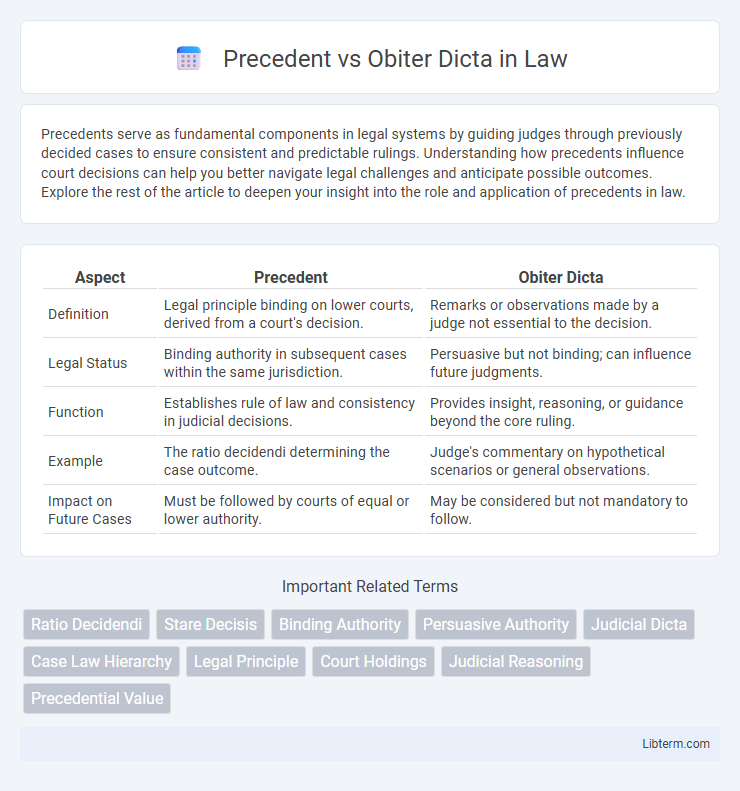Precedents serve as fundamental components in legal systems by guiding judges through previously decided cases to ensure consistent and predictable rulings. Understanding how precedents influence court decisions can help you better navigate legal challenges and anticipate possible outcomes. Explore the rest of the article to deepen your insight into the role and application of precedents in law.
Table of Comparison
| Aspect | Precedent | Obiter Dicta |
|---|---|---|
| Definition | Legal principle binding on lower courts, derived from a court's decision. | Remarks or observations made by a judge not essential to the decision. |
| Legal Status | Binding authority in subsequent cases within the same jurisdiction. | Persuasive but not binding; can influence future judgments. |
| Function | Establishes rule of law and consistency in judicial decisions. | Provides insight, reasoning, or guidance beyond the core ruling. |
| Example | The ratio decidendi determining the case outcome. | Judge's commentary on hypothetical scenarios or general observations. |
| Impact on Future Cases | Must be followed by courts of equal or lower authority. | May be considered but not mandatory to follow. |
Introduction to Precedent and Obiter Dicta
Precedent refers to judicial decisions that establish a legal principle or rule that courts must follow in future similar cases, ensuring consistency and predictability in the law. Obiter dicta are remarks or observations made by a judge in a legal opinion that are not essential to the decision and therefore do not have binding authority. Understanding the distinction between precedent and obiter dicta is crucial for legal interpretation and application, as precedent carries binding authority while obiter dicta serve as persuasive guidance.
Defining Legal Precedent
Legal precedent refers to previous judicial decisions that establish a rule or principle used by courts to decide subsequent cases with similar facts. Precedent can be binding, known as ratio decidendi, which constitutes the court's essential reasoning, or persuasive, exemplified by obiter dicta, statements made in passing not legally binding but influential. Understanding the distinction between binding precedent and obiter dicta is critical for interpreting how courts apply and evolve legal principles over time.
Understanding Obiter Dicta
Obiter dicta are remarks or observations made by a judge in a legal opinion that are not essential to the decision and therefore not legally binding as precedent. These statements provide insight into the judge's thinking and can be persuasive in future cases but do not carry the same authoritative weight as the ratio decidendi, which forms the binding precedent. Understanding obiter dicta helps legal professionals distinguish between binding rules and persuasive commentary in judicial opinions.
Key Differences Between Precedent and Obiter Dicta
Precedent consists of legal principles established in judicial decisions that courts are obligated to follow in future cases with similar facts, serving as binding authority. Obiter dicta refer to remarks or observations made by judges in their judgments that are not essential to the decision and therefore do not have binding authority, but may hold persuasive value. The key difference lies in the binding nature: precedent forms the core legal rule that must be applied, whereas obiter dicta are non-binding commentary without mandatory effect.
Role of Precedent in Judicial Decision-Making
Precedent serves as a binding authority in judicial decision-making, ensuring consistency and predictability by obligating courts to follow established legal principles from prior rulings. Unlike obiter dicta, which are non-binding remarks or observations made in judgments, precedent directly influences case outcomes and legal interpretations. This hierarchical application of precedent upholds the rule of law by guiding judges in applying settled doctrines to similar factual scenarios.
Influence of Obiter Dicta on Legal Reasoning
Obiter dicta, while not binding as precedent, significantly influence legal reasoning by providing persuasive guidance that courts often consider when facing novel or complex issues. Judges reference obiter dicta to support interpretative arguments and to anticipate how future rulings might be shaped, thereby shaping the development of common law. This indirect influence helps refine judicial decisions and promotes consistency across different cases, even though it lacks the obligatory authority of ratio decidendi.
Precedent: Binding Authority in Courts
Precedent serves as binding authority in courts, compelling judges to follow established legal principles set by higher courts within the same jurisdiction. It ensures consistency and predictability in judicial decisions by obligating lower courts to adhere to previous rulings on similar issues. This doctrine preserves legal stability and guides judicial reasoning in subsequent cases.
Obiter Dicta: Persuasive but Non-Binding
Obiter dicta are remarks or observations made by judges in a legal opinion that are not essential to the decision and therefore lack binding authority. These statements serve as persuasive precedent, providing guidance for future cases but do not impose legal obligations on lower courts. Courts often consider obiter dicta to understand judicial reasoning and interpret legal principles, though they remain non-binding compared to the ratio decidendi.
Case Studies Illustrating Precedent and Obiter Dicta
In the landmark case Donoghue v Stevenson (1932), the ruling established a binding precedent defining the modern concept of duty of care, demonstrating how precedent operates as authoritative legal guidance. In contrast, the obiter dicta in R v Brown (1993) included judges' comments on the limits of consent in assault cases, which, while influential, were not legally binding and serve as persuasive observations. These case studies illustrate how precedents create mandatory rules, whereas obiter dicta provide interpretative insights that can influence future judicial decisions without constituting binding authority.
Conclusion: Importance in Legal Systems
Precedent establishes binding legal principles that courts must follow, ensuring consistency and predictability in judicial decisions. Obiter dicta, while not binding, provide persuasive insights that can influence future case law and judicial reasoning. The interplay between precedent and obiter dicta is crucial for the evolution and adaptability of legal systems worldwide.
Precedent Infographic

 libterm.com
libterm.com